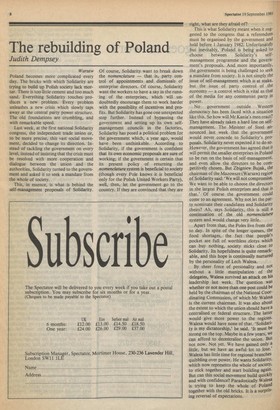The rebuilding of Poland
Judith Dempsey
Warsaw Poland becomes more complicated every day. The bricks with which Solidarity are trying to build up Polish society lack mortar. There is too little cement and too much sand. Everything Solidarity touches produces a new problem. Every problem unleashes a new crisis which slowly taps away at the central party power structure. The old foundations are crumbling, and with remarkable speed.
Last week, at the first national Solidarity congress, the independent trade union or, to be more precise, this vast social movement, decided to change its direction. Instead of tackling the government on every level, instead of insisting that the crisis must be resolved with more cooperation and dialogue between the union and the authorities, Solidarity turned to the government and asked it to seek a mandate from the whole of society.
This, in essence, is what is behind the self-management proposals of Solidarity. Of course, Solidaritywant to break down the nomenclatura — that is, party control of appointments and dismissals of enterprise directors. Of course, Solidarity want the workers to have a say in the running of the enterprises, which will undoubtedly encourage them to work harder with the possibility of incentives and profits. But Solidarity has gone one unexpected step further. Instead of bypassing the government and setting up its own selfmanagement councils in the factories, Solidarity has posed a political problem for the government which, a year ago, would have been unthinkable. According to Solidarity, if the government is confident that its own economic proposals are sure of working; if the government is certain that its present policy of returning the nomenclatura system is beneficial to society (though every Pole knows it is beneficial only for the Polish United Workers Party), well, then, let the government go to the country. If they are convinced that they are right, what are they afraid of?
This is what Solidarity meant when it suggested to the congress that a referendum must be organised by the government and held before 1 January 1982. Unfortunately but inevitably, Poland is being asked to choose between Solidarity's self management programme and the government's proposals. And more importantly, the government is being challenged to seek a mandate from society. It is not simply the issue of self-management which is at stake, but the issue of party control of the economy — a control which is vital as that of the media for any communist party in power.
No government outside Western democracy has been faced with a situation like this. So how will Mr Kania's men react? They have already taken a hard line on selfmanagement. The Minister of Steel announced last week that the government would never concede to Solidarity's proposals. Solidarity never expected it to do so. However, the government has agreed that it will permit the smaller enterprises in Poland to be run on the basis of self-management, and even allow the directors to be competitively chosen. But Zbigniew Bujak, the chairman of the Mazowsze (Warsaw) region of Solidarity said: 'We will not compromise, We want to be able to choose the directors in the largest Polish enterprises and that Is that.' Of course the government could come to an agreement. Why not let the party nominate their candidates and Solidarity theirs? Ah, says Solidarity, this is still a continuation of the old nomenclatura system and would change very little.
Apart from that, the Poles live from day to day. In spite of the longer queues, the food shortages, the fact that people's pocket are full of worthless zlotys which can buy nothing, society sticks close to Solidarity. Its hopefulness is quite remarkable, and this hope is continually nurtured by the personality of Lech Walesa.
By sheer force of personality and not without a little manipulation of the delegates, Walesa survived an attack on his leadership last week. The question was whether or not more than one post could be held by the chairman of the National Coordinating Commission, of which Mr Walesa is the current chairman. It was also about the extent to which the union should have a centralised or federal structure. The latter would give more power to the regions. Walesa would have none of that. 'Solidarity is my dictatorship,' he said. 'It must be strong on the top. Maybe in a few years, we can afford to decentralise the union. But not now. Not yet. We have gained only a little, but we have an awful lot to lose. Walesa has little time for regional branches quibbling over power. He wants SolidaritY, which now represents the whole of societY, to stick together and start building again. But can this social movement build quicklY and with confidence? Paradoxically Walesa is trying to keep the whole of Poland together with the old bricks. It is a surprising reversal of expectations.


































 Previous page
Previous page